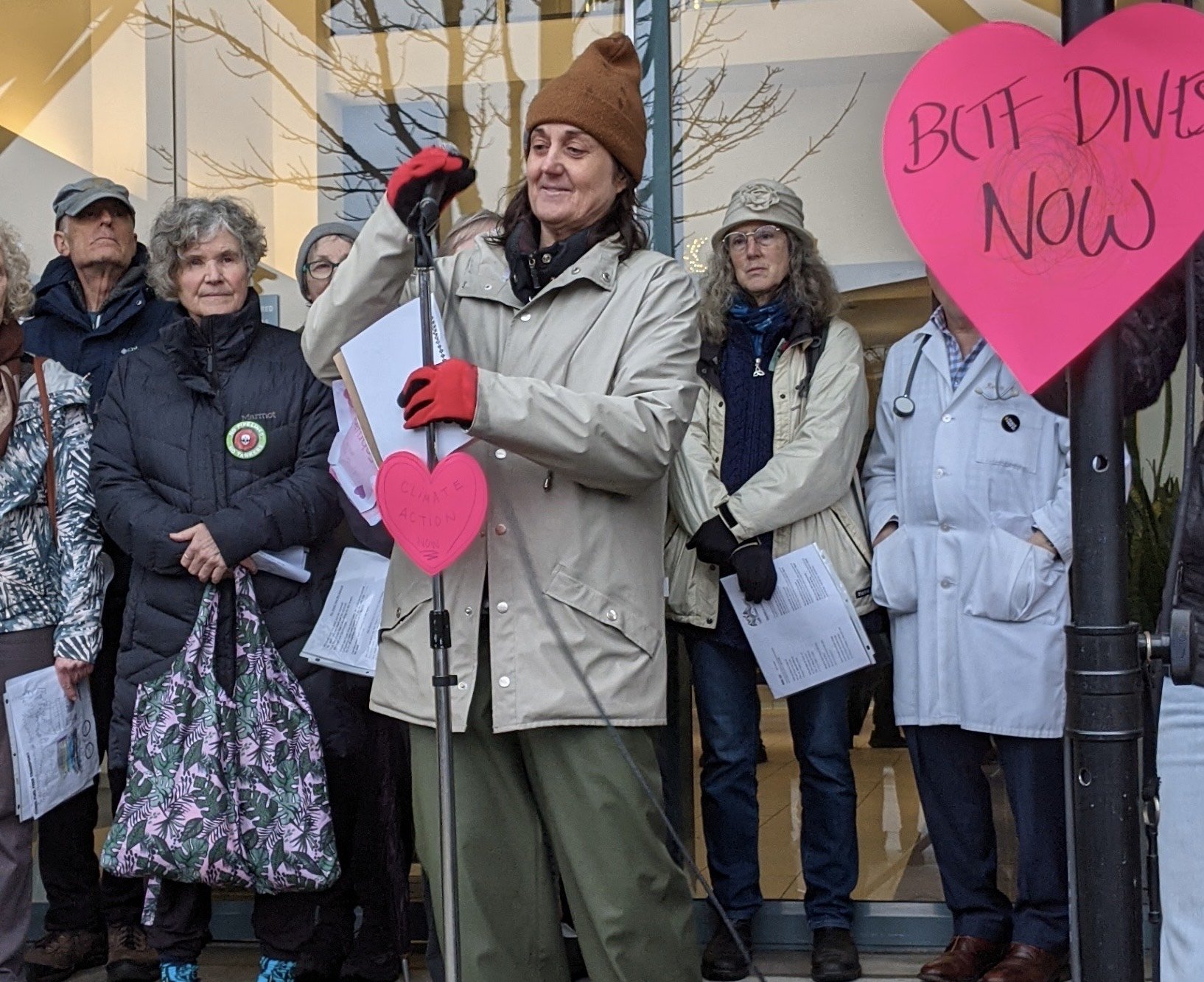I have been a B.C. teacher since 1996 and have sent more than 5,000 students, armed with knowledge of literature and psychology, into a world that climate scientists are warning will soon be unlivable if we don’t stop burning fossil fuels immediately.
B.C. had 90 forest fires burning last month. Alberta is in a historic drought and also seeing forest fire season in mid-winter. And 2024 is predicted to be hotter, drier and smokier than 2023. However, everywhere we look, governments are shovelling subsidies into destructive fossil fuel industries. Fossil fuel subsidies are propping up the very industries that are killing our children. However, the public is waking up to this deadly con. In late 2023, after 25,000 people took to the streets, the Dutch government capitulated on fossil fuel subsidies, with lawmakers approving a motion requiring cabinet to come up with a plan to phase out fossil fuel subsidies.
What is also starting to become public knowledge is how public pensions overseen by Crown corporations are shovelling obscene amounts of money into the pockets of fossil fuel companies, making retirement savings yet another fossil fuel subsidy. The BC Teachers’ Pension Plan, which is managed by the British Columbia Investment Management Corporation, is the official pension plan for the BC Teachers’ Federation (BCTF).
Teachers give 11.13 per cent of their paycheques, plus 11.3 per cent contributed by the employer, to the Crown corporation, which invests in such climate-destroying companies as ExxonMobil, TC Energy, Suncor, Teck Resources, Imperial Oil and KKR Private Equity. These corporations have all recently come under fire for rampant environmental destruction and the trampling of Indigenous rights.
Recently, award-winning author of Fire Weather, John Vaillant, testified in front of a Commons committee on the devastating consequences of Canada continuing down this terrible path. He quite succinctly and terrifyingly lays out how, if our leaders don’t act immediately, we will lose EVERYTHING.
Shift Action for Pension Wealth and Planet Health just released its analysis of Canada’s public pensions and in its report, the British Columbia Investment Management Corporation (BCI), the investment manager for the BC Teachers’ Pension Plan and 10 other public pensions in the province, got a C-. BCI has no Paris-aligned targets, is not a member of any credible Paris-aligned investor body, has placed no exclusions on new investment in oil and gas and worst of all, has no policy requiring companies to respect Indigenous Peoples’ rights to free, prior and informed consent for projects affecting them.
In February, the Institute for Energy Economics and Financial Analysis released a report claiming that a strategic divestment plan would actually strengthen the BC Teachers’ Pension Plan. The report states that “over the last decade, shedding oil, gas and coal has proven a winning financial strategy — even taking the recent energy crisis into account.” In fact, one study by Corporate Knights estimates that had BCI divested 10 years ago, portfolio returns may have been 37.4 per cent higher, which equates to roughly $18,000 more per member.
If there are both moral AND financial imperatives to defund the corporations that are pumping dangerous heat into the atmosphere, are B.C. and Canada using public pensions to prop up the industries?
According to the federal government website, “Canada is the third exporter of crude oil, the sixth of natural gas, the sixth of coal and the sixth of uranium.” Is the fossil fuel lobby so strong that it is able to pillage our educators’ salaries to prop up its dying industry?
In 2021, Kim Benson of the Sea to Sky Teachers' Association and I co-founded the BCTF Divest Now campaign with the aim of divesting our pension. We thought this would be easy — once teachers knew their pensions were contributing to the destruction of their students’ futures, they would immediately take steps to divest. We all got into this profession because we love our children, right?
We created our website, Instagram and Twitter (well, formerly known asTwitter) pages and started spreading the word. Teachers were immediately engaged. The Greater Victoria Teachers’ Association and the Vancouver Secondary Teachers’ Association brought motions to the 2022 and 2023 annual general meetings, and teachers voted overwhelmingly for these motions asking their executive to lobby for divestment. However, after sending a singular inquiry about divestment, the BCTF has given up on lobbying without fulfilling its obligation to follow through on the two motions passed by the federation.
The BCTF executive clearly believes there is no room for progress for the BC Teachers’ Pension Plan. However, the BC Municipal Pension Plan was able to advocate for a net-zero by 2050 commitment and a goal to reduce the carbon emissions of its portfolio by 55 per cent by 2030. As BCTF members, we are expected to count on our executive to be our voice and advocate for the earnest fulfilment of these motions.
We are expected to place our faith in the idea that the executive team has our interest and the interest of the children and families we serve at the forefront of its work. But when it comes to teachers’ forced investment in the corporations that are robbing all children of a future, nothing — not a tweet, an email or an Instagram post. With global temperatures blowing past 1.5 C of warming and another apocalyptic fire season ahead, what will it take to get the BCTF and its president to make a statement reflecting the wishes of their membership to stop their salaries being appropriated to fund these atrocities?
This AGM, teachers will once again be calling on the BCTF to act on climate. If you are a B.C. teacher, talk to your local representative about advocating for stronger climate policy for our pensions and supporting divestment candidates. I will be one of them.
Jillian Maguire has been a B.C. teacher for over 25 years. She has been researching the BC Teachers’ Pension Plan and British Columbia Investment Management Corporation for the past two years, is a director for the Car Free Stanley Park Society, and is running for BCTF president at the 2024 BCTF AGM, which wraps up March 19.
Yes!! And I plan to present a
Yes!! And I plan to present a summary of this report to the membership meeting of my District 2 Burnaby region of the Municipal Pension Retirees Association this Friday, March 22nd, with a proposal to have our H Q in Kelowna take a challenge to the BCI AGM in October. Some of us have questioned the BCI at past AGMs about investments in such entities as private water corporations, and they have said that they don't do such unethical investments. Welllll...!! What is unethical about maintaining a situation that we know will kill us all?!!!
Are BC teachers subsidizing
Are BC teachers subsidizing oil companies with their pensions? I don't see why not. My pension plan, AIMCo, certainly does. And if Danielle Smith gets her claws into even a LITTLE of the Canada Pension Plan, that'll become a slush fund for the oilpatch, too.
Fight it, friends. You in BC at least have a chance. We in Oilberduh are stuck with Know-Nothing Smith, who tells our government agencies what to do.
Many kudos to Ms. Maguire.
Many kudos to Ms. Maguire.
I was happy to read that the BC Municipal Pension Plan will be more than half divested of fossil fuels by the end of the decade. The Plan prides itself in paying 85% of current pension benefits from investment earnings, with just 15% being fresh drawdowns directly from the fund.
Renewables and public infrastructure like transit could provide great benefit to society while also generating stable long term returns to the pension fund investors.
I also see public pension plan investments as a great way to offset government debt when building capital intensive public infrastructure without resorting to private corporate financing or, gawd forbid, private ownership and management of public projects.
Very large national infrastructure projects like nation-wide clean power corridors or high-speed intercity rail require deep financing, and public pension funds are large and powerful enough to give private banks pause.
Government project managers and public pension investment boards could negotiate favourable terms over, for example, long term lease rates for tunnels and bridges and what have you. Pension fund managers would arguably put more value on long term stable, predictable returns than private financiers who look more favourably at short term profits.
Moreover, I would trust long term 30-50 year operating management policies and practices where management is blended between government appointees and public pension plan appointees than a private financier-operator. A public management structure would respond very quickly to increases in demand compared to a private operator who would rather cut service in high demand periods or pay less to its employees to jack profits.






Comments